
BY VREDON | 1 JAN 2023
How artificial intelligence shaping the future of technology
Artificial intelligence (AI) is a rapidly evolving field that has the potential to shape the future of technology in countless ways. From self-driving cars to virtual personal assistants, AI is already being used in a wide range of applications, and this trend is expected to continue in the coming years. Here are a few ways that AI is shaping the future of technology:
Automation of repetitive tasks: One of the most immediate ways that AI is shaping the future of technology is by automating repetitive and mundane tasks. This allows companies to be more efficient and productive, freeing up employees to focus on more important and value-added tasks.
Intelligent virtual assistants: AI-powered virtual assistants are becoming increasingly popular, and they are becoming more and more sophisticated. These intelligent assistants can understand natural language, carry out complex tasks, and even learn from their interactions with users.
Improved decision-making: AI is also being used to improve decision-making in various industries such as finance, healthcare and retail. AI systems can process vast amounts of data and identify patterns and insights that humans might miss, helping companies to make more informed decisions.
Advancements in robotics: Robotics and AI are closely related, and AI is playing a key role in advancing the capabilities of robots. With AI, robots can learn from their environment, adapt to new situations, and even work alongside humans.
Predictive analytics and machine learning: AI is also used in predictive analytics and machine learning, which allow for the identification of patterns and insights in large data sets. This can be used for example in healthcare to identify high-risk patients or in marketing to identify key customer segments.
Cybersecurity: AI is also being used to improve cybersecurity, by identifying and blocking potential threats in real-time. AI-powered systems can analyze network activity, identify anomalies, and take action to protect the system from attack.
Improve accessibility: AI can also be used to improve accessibility, for example, helping people with disabilities to interact with technology more easily, or providing more personalized and tailored experiences.
Advancements in self-driving cars: AI is also being used to develop self-driving cars. With the ability to process vast amounts of data, AI-powered cars can make decisions, navigate, and drive autonomously, making our roads safer and more efficient.
It's clear that AI has the potential to shape the future of technology in many different ways. As AI technology continues to improve, we can expect to see even more exciting developments in the near future. It is important for the industries and society to work together to understand and shape the impact of AI in a responsible way, as it can bring many benefits but also have significant ethical and societal implications.



